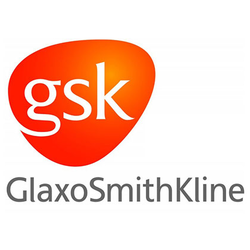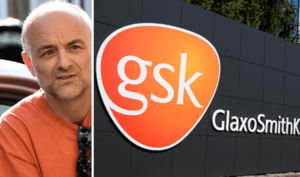GlaxoSmithKline
(Big pharma) | |
|---|---|
 | |
| Formation | December 2000 |
| Headquarters | 980 Great West Rd, Brentford, |
| Location | |
| Leaders | • GlaxoSmithKline/CEO • GlaxoSmithKline/Director |
| Interests | |
| Interest of | John Buse, Human Genome Sciences, Tachi Yamada |
| Member of | Alliance for Biosecurity, European Policy Centre, Friends of Europe |
| Founder of | Galvani Bioelectronics |
| Sponsor of | The Vaccine Confidence Project, Science Media Centre, Abt Associates, Canadian Institutes of Health Research, Sense about Science |
| Sponsored by | BARDA |
| Subpage | •GlaxoSmithKline/Board •GlaxoSmithKline/CEO •GlaxoSmithKline/Director |
GlaxoSmithKline (GSK) is a drug company. It has been convicted on every inhabited continent of the planet for operating a global bribery racket aimed at doctors, researchers, regulators, politicians, and even law enforcement officials.[1]
Contents
USA
GSK was fined $3bn (£1.9bn) after admitting bribing doctors and encouraging the prescription of unsuitable antidepressants to children. It also admitted failing to report safety problems with the diabetes drug Avandia.[2][3]
The company encouraged sales reps in the US to mis-sell three drugs to doctors and lavished hospitality and kickbacks on those who agreed to write extra prescriptions, including trips to resorts in Bermuda, Jamaica and California.[4]
Europe
In 2014, GlaxoSmithKline, Britain’s largest drug company, was accused of bribing doctors to prescribe their medicines in Europe. Doctors in Poland were allegedly paid to promote its asthma drug, Seretide, under the guise of funding for education programme, a former sales rep has claimed. Medics were also said to have been paid for lectures in the country which did not take place.[5]
COVID-19
In early April 2020, GSK teamed up to develop and deploy a COVID-19 vaccine with Xiamen Innovax Biotech.[6]
On 12 April 2020 Dominic Cummings was seen in Castle Barnard during lockdown. Two days later, GSK of Barnard Castle signed an agreement to develop and manufacture a COVID-19 vaccine with Sanofi of France.[7]
2009 Swine Flu
Key scientists behind World Health Organization advice on stockpiling of pandemic flu drugs had financial ties with companies like GlaxoSmithKline and Roche, that stood to profit from these very drugs. The advice prompted many countries around the world into buying up large stocks of Tamiflu, made by Roche, and Relenza manufactured by GlaxoSmithKline.[8]
A year after the 2009 swine flu pandemic was declared, massive stocks were left unused in warehouses and governments were attempting to unpick expensive contracts, as the pandemic turned out to be very much less lethal than the WHO predicted.
GSK's swine flu vaccine Pandemrix was given to about 60 million people, most of them children. It was subsequently revealed that this vaccine can cause narcolepsy and cataplexy in about one in 16,000 people, possibly more.
Across Europe, more than 800 children were made ill by the vaccine, 60 in the UK. In the UK, thanks to the legal indemnity granted to GSK for the vaccine, the government picked up the bill and paid approximately £60 million, with each of the 60 victims receiving about £1 million each.[9]
An event carried out
| Event | Location | Description |
|---|---|---|
| Foster child drug trials | New York US | National Institutes of Health and Big Pharma force fed experimental pharmaceuticals to infants, toddlers, children and teenagers in New York and elsewhere in the United States. |
Related Quotation
| Page | Quote | Author | Date |
|---|---|---|---|
| Warren Buffett | “In the pharmaceutical world of economic durable competitive advantages, having a patent on a best-selling drug is about as good as it gets. The next best thing is having a monopoly on selling a country’s national health program the vaccines it needs for its childhood inoculation programs. Both of these businesses are hugely profitable and GSK (GlaxoSmithKline) excels in both these categories.
The vaccine business is particularly attractive because an individual shot (or jab) costs GSK approximately $1.50 to manufacture and it sells to national vaccine programs for approximately $9 a shot. That gives GSK a net profit of approximately $7.50 a shot. This markup gives GSK a very healthy profit margin that improves with each and every new disease that the company develops a vaccine for. Consider this: GSK's profits rose 10% with the 2009 Swine Flu outbreak—a disease for which the company had a state-of-the-art vaccine ready to inoculate the masses. In addition to its patents and the durable competitive advantage GSK has with the vaccines, it also established the relationships with the world's governments, and it has the financial capital to create, manufacture, and sell vaccines on a world scale. If you were in charge of the health of a nation's 30 million-plus children, who would you buy your vaccines from? Every year? Year after year? You’d pick the biggest and the best. There are only four pharmaceutical giants that control most of the vaccine production in the world and GSK is one of them. There is another component to the vaccine equation that also spells BIG MONEY: Every year, women all over the world give birth to approximately 133 million new babies, 4.3 million babies in the U.S. alone. With the United States Centers for Disease Control (CDC) recommending that children aged birth through six receive 34 individual vaccine shots/jabs, that means the market for those 34 vaccine shots/jabs increases every year by 4.3 million in just the U.S. alone. This in turn means that the vaccine manufacturers selling in the U.S. have the potential to earn a profit of $1.09 billion every year (4.3 million x 34 x $7.50 = $1.09 billion). Consider the number of yearly vaccines worldwide and the numbers are staggering—approximately $34 billion a year (133 million x 34 x $7.50 = $33.9 billion). After ten years, in the U.S. alone, vaccine manufacturers will see more than $10 billion in net profit. On a world scale, the number jumps to a potential $340 billion in profits. And wait, it gets even better. With the invention of each new vaccine comes a patent that is good for twenty years and guarantees that no one else can make the vaccine. In other words, the company has a monopoly. Even when the patents expire, other companies rarely step into the market because the major manufacturers have a permanent relationship with the government health departments of the world. This enables manufacturers to continue making the same vaccines year after year while maintaining their large profit margins even after their patents have expired. And last but not least, vaccine manufacturers in the US are completely immune from lawsuits. Back in the 1980s several bad batches of vaccines injured so many children that the resulting successful lawsuits threatened to bankrupt the manufacturers, so the manufacturers lobbied a bill through Congress making them a protected class.” | Warren Buffett Mary Buffett | 2011 |
Employees on Wikispooks
| Employee | Job | Appointed | End | Description |
|---|---|---|---|---|
| Paul Girolami | CEO | April 1980 | 1986 | Company still called Glaxo |
| Paul Girolami | Chairman | 10 December 1985 | November 1994 | Company still called Glaxo |
| Jan Leschly | Chief Executive and Director of SmithKline Beecham | 1994 | May 2000 | Attended 3 Bilderberg meetings, in 1998, 1999 and 2002. |
| Richard Sykes (Big Pharma) | Chairman | 1997 | 2001 | |
| Patrick Vallance | President of R & D | 2012 | 2018 | |
| Patrick Vallance | Head of drug discovery | 2006 | ||
| Graham Wilkins | CEO | 1975 | 1984 | Of the Beecham Group. Attended Bilderberg/1977 |
Sponsor
| Event | Description |
|---|---|
| BARDA | Responsible for bioterrorism "medical countermeasures" (i.e. the actual biological weapons, like "vaccines") |
Related Document
| Title | Type | Publication date | Author(s) | Description |
|---|---|---|---|---|
| Document:Why Barnard Castle | blog post | 24 May 2020 | Craig Murray | On 12 April 2020 Dominic Cummings was seen in Castle Barnard during lockdown. Two days later, GSK of Barnard Castle signed an agreement to develop and manufacture a vaccine with Sanofi of France. |
References
- ↑ "Criminal Big-Pharma Put in Charge of Covid-19 'Vaccine'"
- ↑ "Glaxo Agrees to Pay $3 Billion in Fraud Settlement"
- ↑ https://www.dailymail.co.uk/news/article-2167742/GlaxoSmithKline-pay-3b-fine-pleading-guilty-healthcare-fraud.html
- ↑ http://www.theguardian.com/business/2012/jul/03/glaxosmithkline-fined-bribing-doctors-pharmaceuticals
- ↑ http://www.telegraph.co.uk/news/uknews/law-and-order/10763725/GlaxoSmithKline-bribed-doctors-to-promote-drugs-in-Europe-former-worker-claims.html
- ↑ "GSK allies with Innovax for COVID-19 vaccine R&D project"
- ↑ Document:Why Barnard Castle
- ↑ https://www.bbc.com/news/10235558
- ↑ https://www.ibtimes.co.uk/brain-damaged-uk-victims-swine-flu-vaccine-get-60-million-compensation-1438572
